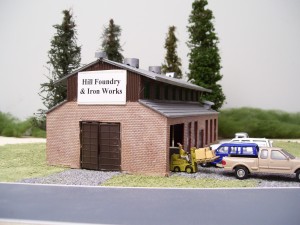
Hill Foundry and Iron Works
With the dawn of 1942, Lake Neccudah businesses found themselves besieged by the Federal Government to produce equipment for the War effort. Many small and medium sized manufacturers had to switch their production capacity to produce everything from parts for B-17 bombers to canteens for the infantry. As young men were called to duty many women were drawn into the workforce for the first time. Resentment toward German residents grew as the war dragged on. It reached the boiling point on Christmas Eve, 1943, when two German youths accosted a young woman returning home from work at the Hill Foundry & Iron Works. Conflicting accounts of the incident were never resolved, but when it was over one German youth lay dead of a gunshot wound and the other was hospitalized with life-threatening injuries. An uneasy tension fell over the town for years. Finally, the war ended and Lake Neccudah, like the rest of the nation, settled into a postwar slump. Gone were the government orders that had fueled growth of the town throughout the war years. Young men returned but jobs were scarce, and the women of the town were not eager to return to the mundane tasks of cooking, cleaning, and raising children.
In 1947 a British immigrant named Harold Bingham came to America seeking to rebuild a life for his wife and two small sons. Mr. Bingham had been a coal miner and then a steel worker at the outbreak of World War II in Sheffield, England. Hard times, and a five hundred pound German bomb, had destroyed everything that Mr. Bingham had worked for. Harold was a ruggedly handsome man, about six feet tall, well built, with steel blue-gray eyes. A few minor scars from intense rugby matches seemed to accentuate his facial good looks. In earlier years Harold had been a bass drummer in a pipe and drum band and he still carried the youthful swagger of someone very confident and comfortable with himself. His girlfriend, Ida Dunwell, had been smitten with him since she could remember. She would bring him his sandwich and a drink to the coal mine where Harold began his working life when he was sixteen. At age twenty Harold learned of a position opening up in one of the steel mills in Sheffield. Eager to get out of the mines he quickly jumped at the chance. The work was long, dirty and suffocatingly hot. But it beat the miserable conditions of a miner any day.
